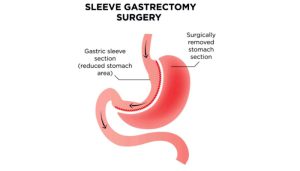Obesity is a growing global concern, with over 650 million adults classified as obese in 2016, according to the World Health Organization. As the prevalence of obesity continues to rise, so does the demand for effective weight loss solutions. One such solution is the gastric sleeve surgery, also known as sleeve gastrectomy, which has gained popularity for its remarkable results in helping individuals shed excess pounds and regain their health. However, not everyone is a suitable candidate for this procedure. In this comprehensive guide, we will explore the qualifications for gastric sleeve surgery, providing valuable insights for individuals considering this life-changing weight loss option.

Gastric Sleeve Qualifications
Before delving into the qualifications for gastric sleeve surgery, it’s essential to understand what this procedure entails.
Gastric sleeve surgery is a minimally invasive bariatric procedure that involves the removal of a large portion of the stomach. The result is a smaller, banana-shaped stomach, which limits the amount of food a person can eat. This surgical alteration not only reduces the quantity of food intake but also influences appetite-regulating hormones, ultimately helping patients lose weight. Gastric sleeve surgery is known for its effectiveness in achieving substantial and sustainable weight loss.
There are several reasons individuals opt for gastric sleeve surgery as their preferred weight loss method:
While gastric sleeve surgery offers numerous benefits, it is not a one-size-fits-all solution. To ensure patient safety and maximize the procedure’s success, strict qualifications are in place. Let’s explore these qualifications in detail.
One of the primary qualifications for gastric sleeve surgery is the individual’s Body Mass Index (BMI). BMI is a measure of body fat based on height and weight. It serves as a guideline to determine whether someone is overweight, obese, or severely obese. The BMI requirement for gastric sleeve surgery typically falls within the range of 35 to 40 or higher. This means that you may qualify for the procedure if:
It’s crucial to remember that BMI alone may not be the only factor considered when evaluating a patient’s suitability for gastric sleeve surgery.
Age plays a significant role in determining eligibility for gastric sleeve surgery. Most bariatric surgeons have a minimum age requirement, typically set at 18 years old. This age restriction is in place because the surgery can have a profound impact on physical and emotional development. Furthermore, the long-term effects of the procedure may not be fully understood in younger patients.
Bariatric surgeons often look at a patient’s weight loss history as part of the qualification process. If an individual has made previous attempts to lose weight through diet, exercise, and other non-surgical methods, it can demonstrate their commitment to lifestyle changes. Some insurance providers may require documentation of prior weight loss attempts before approving gastric sleeve surgery.
Before undergoing gastric sleeve surgery, patients are typically required to undergo a psychological evaluation. This evaluation assesses the patient’s mental and emotional readiness for the significant lifestyle changes that come with the procedure. It’s important to have realistic expectations and a support system in place to navigate the emotional challenges of post-surgery life.
In addition to BMI and psychological readiness, individuals seeking gastric sleeve surgery must undergo a thorough health assessment. This evaluation includes a review of medical history, current health conditions, and any medications or supplements being taken. Some pre-existing health conditions may affect eligibility or require additional precautions before surgery.
Qualifying for gastric sleeve surgery isn’t solely about meeting specific physical criteria. Patients are also expected to demonstrate a commitment to making lasting lifestyle changes. These changes may include adopting a healthier diet, engaging in regular physical activity, and attending follow-up appointments with healthcare providers.
Individuals interested in gastric sleeve surgery should schedule a consultation with a bariatric surgeon. During this consultation, the surgeon will assess the patient’s specific case and discuss the risks, benefits, and expected outcomes of the procedure. It’s an opportunity for the patient to ask questions and gain a better understanding of the surgical process.
Some individuals with a lower BMI may still qualify for gastric sleeve surgery if they have severe obesity-related health conditions. These conditions may include type 2 diabetes, heart disease, sleep apnea, or hypertension. The presence of such conditions can influence the decision to move forward with surgery, as addressing obesity can have a significant impact on managing these health issues.
While the typical age requirement for gastric sleeve surgery is 18, there are cases where the procedure is performed on adolescents and teenagers. These cases are carefully considered and involve a thorough assessment of the patient’s physical and emotional maturity. The decision to perform gastric sleeve surgery on younger individuals is usually made in consultation with pediatric specialists and mental health professionals.
Women who are planning to become pregnant in the near future may need to postpone gastric sleeve surgery. Pregnancy and significant weight loss can interact in complex ways, so it’s essential to discuss family planning with your healthcare provider.
Certain medical conditions or medications may affect a patient’s eligibility for gastric sleeve surgery. For example, uncontrolled mental health conditions, substance abuse issues, or certain blood clotting disorders may require additional consideration or management before surgery can proceed.
Insurance coverage for gastric sleeve surgery can vary widely. While many insurance providers do cover bariatric procedures when specific criteria are met, it’s essential to check your policy and understand the requirements for approval. Some insurers may necessitate documented attempts at non-surgical weight loss methods or proof of obesity-related health conditions.
As we discuss the qualifications for gastric sleeve surgery, it’s important to also highlight the potential benefits of the procedure:
Gastric sleeve surgery offers one of the most effective ways to lose weight and maintain that weight loss over time. Patients often experience rapid weight reduction in the first year after the surgery, which can lead to a healthier, more active lifestyle.
Weight loss through gastric sleeve surgery can lead to the resolution or significant improvement of obesity-related health conditions such as type 2 diabetes, hypertension, and sleep apnea. This can result in a reduced need for medications and a higher quality of life.
Many individuals who undergo gastric sleeve surgery report enhanced quality of life, including increased mobility, self-esteem, and overall well-being. They often find it easier to engage in physical activities, enjoy social interactions, and achieve personal and professional goals.
Gastric sleeve surgery provides long-term results, with many patients maintaining a significant portion of their weight loss for years. The procedure’s success is attributed to both the reduced stomach size and the associated changes in appetite-regulating hormones.
Gastric sleeve surgery can have a positive impact on mental health, as individuals often experience increased self-confidence and reduced anxiety or depression associated with obesity.
It’s important to acknowledge that any surgical procedure carries risks, and gastric sleeve surgery is no exception. Patients should be aware of the potential complications, even if they meet the qualifications for the procedure. Some common risks and complications include:
Infection at the incision sites is a potential risk following gastric sleeve surgery. This risk is minimized through proper surgical techniques and post-operative care.
While rare, bleeding can occur during or after the surgery. Surgeons take precautions to minimize this risk.
Gastric sleeve surgery involves stapling and sealing the stomach. In rare cases, leaks can occur along the stapled line, leading to infection and other complications. Proper surgical technique and post-operative monitoring are essential for minimizing this risk.
After gastric sleeve surgery, patients must adhere to a strict dietary regimen to ensure they receive essential nutrients. Failure to do so can lead to nutritional deficiencies, which may require supplementation.
Ulcers can develop in the remaining portion of the stomach following surgery. Medications and dietary adjustments can help manage this risk.
Some patients may experience or exacerbate symptoms of GERD after gastric sleeve surgery. This condition may require medication or additional treatment.
Weight loss after gastric sleeve surgery can increase the risk of gallstone formation. Surgeons may recommend gallbladder removal if necessary.
The emotional and psychological challenges of adjusting to post-surgery life are significant. Patients may experience feelings of loss or mourning related to changes in eating habits and body image.
If you meet the qualifications for gastric sleeve surgery and decide to proceed, thorough preparation is essential. Here are some key steps to take before the surgery:
Selecting an experienced and qualified bariatric surgeon is crucial. Research potential surgeons, read reviews, and schedule consultations to find the right fit for your needs.
Many bariatric centers offer informational seminars or workshops to help patients understand the surgical process, lifestyle changes, and expectations. Attending these events can be highly beneficial.
If you plan to use insurance to cover the cost of the surgery, ensure you meet all the necessary requirements and documentation.
Prepare your support system by sharing your decision with friends and family. Their support can be invaluable during your weight loss journey.
Follow your surgeon’s recommendations for pre-operative evaluations, which may include medical assessments, dietary counseling, and psychological evaluations.
Many surgeons recommend a pre-operative diet to reduce the size of the liver, making surgery safer and more accessible. It’s crucial to adhere to these guidelines strictly.
After successfully meeting the qualifications and undergoing gastric sleeve surgery, the real work begins in maintaining a healthy lifestyle. Here are some key aspects of life after the procedure:
Patients must adhere to a strict post-operative diet to facilitate healing and adjust to their reduced stomach size. The diet typically progresses from liquids to soft foods and, eventually, regular foods in small portions.
Incorporating regular physical activity is essential for long-term success. Consult with a fitness professional to create an exercise plan tailored to your individual needs and abilities.
Joining support groups for bariatric patients can provide emotional support and practical advice on managing life after gastric sleeve surgery.
Regular follow-up appointments with your surgeon and healthcare team are vital to monitor your progress and address any concerns or complications.
Continue to work on your emotional and psychological well-being by seeking support from mental health professionals or support groups. Addressing the emotional aspects of your journey is just as important as the physical ones.

Gastric sleeve surgery can be a life-changing solution for individuals struggling with obesity and its associated health issues. However, the qualifications for this procedure are essential to ensure patient safety and maximize the likelihood of a successful outcome. It’s crucial to meet the required BMI criteria, undergo a comprehensive health evaluation, and demonstrate a commitment to lifestyle changes. While the surgery comes with potential risks and complications, the benefits, including significant weight loss and improved health, are often well worth it. If you’re considering gastric sleeve surgery, consult with a qualified bariatric surgeon to determine your eligibility and embark on a journey toward a healthier, happier life.
Dont forget to follow us on our social media.
– Youtube
– Instagram
– Tiktok
Also, you can check this testimonial podcast on our Youtube channel
We will provide you with immediate follow-up!
In order to offer you the method that best suits your needs, it is crucial for us to have knowledge of your medical history.
Please complete the following detailed health questionnaire with as much information as possible.
This will help us get to know you better.
©2023 Dr. Luis Pasten | Overweight Reduction Center | All Rights Reserved.